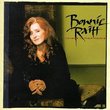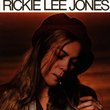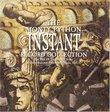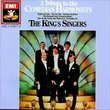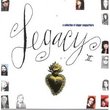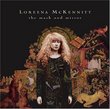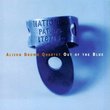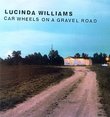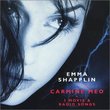| All Artists: Wolfgang Amadeus Mozart, Carlo Maria Giulini, Eberhard Wächter, Joan Sutherland, Philharmonia Chorus and Orchestra, Luigi Alva, Gottlob Frick, Elisabeth Schwarzkopf, Piero Cappuccilli Title: Mozart - Don Giovanni / Wächter · Sutherland · Alva · Frick · Schwarzkopf · Taddei · Cappuccilli · Sciutti · Giulini Members Wishing: 0 Total Copies: 0 Label: EMI Classics Release Date: 9/23/1997 Genre: Classical Styles: Opera & Classical Vocal, Historical Periods, Classical (c.1770-1830), Modern, 20th, & 21st Century Number of Discs: 3 SwapaCD Credits: 3 UPCs: 724355623225, 724355623256 |
Search - Wolfgang Amadeus Mozart, Carlo Maria Giulini, Eberhard Wächter :: Mozart - Don Giovanni / Wächter · Sutherland · Alva · Frick · Schwarzkopf · Taddei · Cappuccilli · Sciutti · Giulini
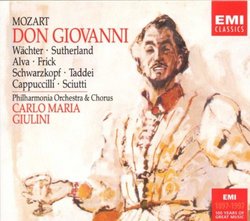 | Wolfgang Amadeus Mozart, Carlo Maria Giulini, Eberhard Wächter Mozart - Don Giovanni / Wächter · Sutherland · Alva · Frick · Schwarzkopf · Taddei · Cappuccilli · Sciutti · Giulini Genre: Classical
This is, in the opinion of many critics, the best recording of the greatest of all operas. The cast is a who's who of great singers from the early stereo era (1959) when the recording was made. At the top of the cast, the ... more » |
Larger Image |
CD DetailsSynopsis
Amazon.com essential recording This is, in the opinion of many critics, the best recording of the greatest of all operas. The cast is a who's who of great singers from the early stereo era (1959) when the recording was made. At the top of the cast, the young Joan Sutherland, whose fresh, agile voice, opulent in tone even at the top of its range, had recently hit the international operatic scene like an earthquake. In the title role, Eberhard Waechter portrays a man obsessed with sex as a game that he must win at any cost--and keeps on losing. Giuiseppe Taddei brings depth and ingenuity to the comic role of the valet Leporello; Luigi Alva treats two of the greatest tenor arias ever written in limpid bel canto style; Carlo Maria Giulini leads a great orchestra with a superb, synergistic balance of musical and dramatic values. --Joe McLellan Similarly Requested CDs
|
CD ReviewsA magnificent recording cdsullivan@massed.net | Cambridge, MA USA | 03/11/2001 (5 out of 5 stars) "Many people consider Mozart to be the greatest composer ever, and consider "Don Giovanni" to be his finest opera ever. I am not going to choose "greatests"; I am going to say that no self-respecting music fan can afford to be without a recording of "Giovanni," and that this 1959 Giulini/EMI set is the one to buy.Plenty of other recordings of this well-recorded work have fabulous singing. What really makes this one a cut above the rest is the absolutely magical conducting of Carlo Maria Giulini (b. 1914). With Toscanini and Serafin, he is the finest Italian conductor of the twentieth century, and this recording is testament to his greatness. From the terrifying yet thrillingly sonorous opening of the overture to the last, joyous bars of the epilogue, he chooses perfect tempi, phrases gorgeously and brings out the drama and lyricism of this glorious opera. No other "Giovanni" conductor on record comes close. Almost every number provides a revelation, particularly after listening to merely mortal conductors ... Listen to his warmth in the Moderato section of the Overture, his sensitive support to the singers in the big ensemble pieces, his terrifying intensity in the penultimate scene ... If you're looking for sublime Mozart conducting, look no further than Giulini. We are fortunate that he was given the great Philharmonia forces to work with; they turn in some glorious choral singing and orchestral playing, rich and full and beautiful and perfect for Mozart. Of course, it doesn't hurt either to have some of the greatest singers of the 1950s in some of their greatest roles. Eberhard Wächter is a honeyed, lyrical Don, second only to Cesare Siepi; listen to his exemplary legato and silken line at "La ci darem" and the Serenade, magnificently secure from the lowest part of his range to his top A in the penultimate scene, sung with unerring dramatic feel, and it is only the extra sumptuous richness and darkness of Siepi that gives the Italian bass the edge. Some of the other benchmark performances include: the young Joan Sutherland producing indescribably glorious sounds as Donna Anna (her diction is better than usual, and she shows a significant amount of involvement in her character) - her two big arias are among the greatest records of her formidable art on disc; Elisabeth Schwarzkopf in her prime, combining sumptuous, radiant tone with fiery interpretation (comparing her with Lisa Della Casa for Krips, one finds that Della Casa's Elvira is slightly more effortlessly sung, but Schwarzkopf's voice is, in my opinion, actually slightly more beautiful, and she shows more involvement in Elvira's plight); Luigi Alva, singing the most beautiful, elegant, effortless sung Don Ottavio ever; the black, thunderous voice of Gottlob Frick as the Commendatore, secure down to a subterranean low D in the climactic scene; the great Italian baritone Piero Cappuccilli at the start of his career singing almost too beautifully as Masetto; Giuseppe Taddei providing a finely detailed, delightfully idiomatic portrait of Leporello, for the most part eloquently sung, only occasionally using his annoying "funny" voice that keeps him in second place to Fernando Corena; Graziella Sciutti as a characterful, charming Zerlina ... this is a line-up unsurpassed on record. The only other recording in this league is Josef Krips' classic 1955 Vienna Decca set, with Siepi, Danco, Della Casa, Corena, Dermota, Güden, Berry and Böhme. The essential performances here are Siepi's glorious Giovanni, Corena's resonant Leporello and above all the golden tones of Güden as the best Zerlina on disc. Krips' recording has a fabulous Viennese glow; this Giulini feels more lyrically Italianate. Both these approaches are valid, but Giulini pulls his view of the piece off more finely than even the excellent Krips; and I definitely give the edge to Giulini's flawless cast. Added to this is the gloriously clear, rich sound of Walter Legge's classic stereo recording. This set is attractively packaged in EMI's (full-price) "Centenary Edition," but I'm hoping that EMI will promote it to the mid-price series where it belongs, "Great Recordings of the Century." If ever there was a great recording, it's this one. It is a classic of the gramophone and needs to be in every collection. Happy listening!" Perfect performance cdsullivan@massed.net | 06/08/1999 (5 out of 5 stars) "With Dame Joan Sutherland supremely cast as Donna Anna, how can you lose? This performance was recorded in 1960, only a little before Sutherland's historical debut at La Scala, Milan as Lucia di Lammermoor in which the diva received 30 curtain calls after an astonishingly sung mad scene. I was there and was completely shattered by gorgeous tone and incredible singing. It really was a revelation in the Art of Bel Canto!!! She was immediately dubbed La Stupenda, and proclaimed Prima Donna Assoluta of the entire world, pushing Maria Callas and Renata Tebaldi aside. This recording of Don Giovanni is a great demonstration of her phenomenal technique and ravishing dramatic soprano tone. From the bottom of the register to all top notes, she sings with complete ease. All staccatos, runs,and appeggios done to absolute perfection. And of course her legendary trill...Zefferelli said, Joan is the phenomenal singer of our time, and of course she is that. But singing side by side with Dame Joan is the gracious soprano Elizabeth Schwarkopf. What a Donna Elvira she is! What style and fire! I can't think of a better performance in all the recordings. Did you know that Scwarkopf and Callas were at Sutherland's rehearsal of Lucia at the Eve of Sutherland's Covent Garden debut? Later Schwarkopf said that both her and Callas were so stunned by Sutherland's voice that they were both completely speechless. This recording using Sutherland as Donna Anna was at the suggestion of Schwarkopf. And how lucky we are to have both of them in the top roles. Wachter has a more sharp edge version of the Don than I prefer, but he sings with passion, which is always good. My favorite male singer here is Luigi Alva, who sings a definitive Don Ottavio. His singing is in the true bel canto style. And then Carlo Maria Giulini conducts with such elegance that makes every aria and ensemble come to life. This is a must have recording and one of the greatest recordings ever made. A zillion stars!!!" Greatest recording of the greatest Opera cdsullivan@massed.net | 05/22/1999 (5 out of 5 stars) "I've heard almost all of the current Don Giovani recordings currently available. No one even comes close to this one. Definitely the definitive recording. Of the young Joan Sutherland's performance of Donna Anna, this was what the legendary Mozartian conductor Bruno Walter said: "She is the best Donna Anna I have ever heard". And indeed she was...plus what a gorgeous voice Joan had those days, along with the greatest technique. Wachter gave us just handsome, handsome sounds as the Don, but also a wonderful sense of drama, we don't have baritones like his in recent times. Schwartzkopf's performance of Donna Elvira had not been equal since I've heard this performance, what magnificent tone and fire!!! She was the complete Mozartian singer of our time. Of Luigi Alva, I'm in awe! What a beautiful lyric tenor, such a command of the taxing coloratura. After hearing this recording, I immediately went out to search for more recordings by this great, and underated tenor!! Now for the conductor, the phenomenal Carlo Maria Giulini. BRAVO!!! Mozart would have been proud of him, as he would have been proud of everyone in this supreme cast. The definitive recording of one of the greatest Operas ever written!!! A thousand stars."
|

 Track Listings (28) - Disc #1
Track Listings (28) - Disc #1